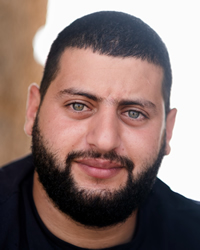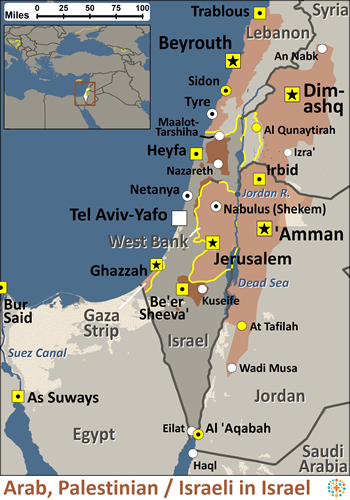One historic event can be interpreted in many ways. The Israelis call the Jewish-Arab war of 1948, "The War of Israeli Independence." The Palestinian Arabs call this same event "al-Nakba" or "The Catastrophe." About 80% of the Arabs who lived in the territory that became Israel were either expelled or fled. The Israeli government has passed laws stating that those Arabs who left cannot return to Israel. The Palestinians who now live in Israel are the descendants of the 20% of Arabs who remained in Israel. Palestinian Arabs currently make up roughly 20% of the Israeli population. The Arab population is growing due to the fact that Arab families tend to have a larger number of children than do Jewish Israelis.
The Israeli government gave the Palestinians living in Israel the choice of becoming citizens or staying as permanent residents. Some Arabs chose to become citizens. They are eligible to vote in elections and take civil service jobs. Some Arabs reject the whole idea of Zionism and declined citizenship. Arab political parties that call for the destruction of the state of Israel are outlawed. The primary language of Palestinian Arabs is their dialect of Levantine Arabic. They also speak modern Hebrew. Educated Palestinians speak English.
The lifestyle of Palestinian Arabs varies greatly. Some are fully integrated into Israel's modern industrial economy while others live as Bedouins and farmers much like their ancestors did. Educated Palestinians who become citizens hold prestigious jobs such as university professors, engineers, business owners, and physicians. The less educated Palestinians live in villages, farm the land, and take care of goats and sheep. Some Arab villages are without electricity and access to clean water and indoor plumbing. Many Palestinians who live in rural areas consider any cooperation with Jewish Israelis as treason. Despite a measure of discrimination, the Palestinians in Israel are better off economically than the Arabs of the neighboring Arab-led nations. Although a Muslim man can marry up to four wives, the large majority of Palestinian men have one wife. Children, especially boys, are viewed as a blessing from Allah. As a result, Arab parents have many children. Sons inherit land and property upon the death of their father. Traditionally, Arab parents chose the spouse of their son or daughter. Today more young people choose their own spouse with the approval of their families. The diet of rural Palestinians basically consists of wheat bread and porridge made with boiled meat or chicken.
Turmoil in Israel and the West Bank/Gaza makes Christian witness to the Palestinians challenging, but turmoil sometimes makes people more open to change.
The large majority of Palestinians are Muslims, mostly Sunnis. The number of Christian Palestinians is estimated to be between five and nine percent. Many of the Christians are migrating to Europe or North America. Christian and Druze Arabs are often placed in separate ethnic categories. Sunnis believe that by following the Five Pillars of Islam that they will attain heaven when they die. However, Allah, the supreme God of the universe, determines who enters paradise. Sunnis pray five times a day facing Mecca. They fast the month of Ramadan. They attend mosque services on Friday. If a Muslim has the means, he or she will make a pilgrimage to Mecca once in his or her lifetime. Muslims are also prohibited from drinking alcohol, eating pork, gambling, stealing, using deceit, slandering, and making idols.
The two main holidays for Sunni Muslims are Eid al Fitr, the breaking of the monthly fast and Eid al Adha, the celebration of Abraham's willingness to sacrifice his son to Allah.
There is a great need for the biblical gospel to be preached among the Palestinian Arabs in Israel.
A Palestinian Muslim who professes faith in Jesus Christ can lose his family, his honor, his job, or even his life. Evangelization efforts are challenging due to restrictions as well as general antagonism to Christianity. Prayerful intercession is the key to reaching them with the gospel. Teams of medical and agricultural workers could show the rural Palestinians the love of Christ.
Pray that God will raise up faithful intercessors who will stand in the gap for the Palestinian Arabs in Israel.
Ask God to give Palestinian Arab believers opportunities to share the love of Christ with their own people.
Pray that their traditional Muslim culture will soften, creating open doors for the good news to be preached among Palestinian Arabs.
Ask the Lord to raise up strong Disciple Making Movement among the Palestinian Arabs in this decade.
Scripture Prayers for the Arab, Palestinian / Israeli in Israel.
| Profile Source: Joshua Project |



























